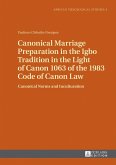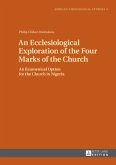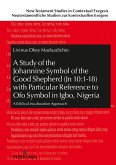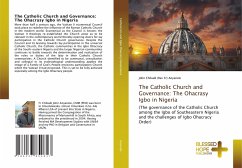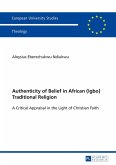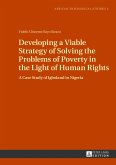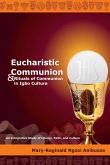John Kachikwulu Ekwunife
Childless Marriages and Child adoption among the Igbo
John Kachikwulu Ekwunife
Childless Marriages and Child adoption among the Igbo
- Broschiertes Buch
- Merkliste
- Auf die Merkliste
- Bewerten Bewerten
- Teilen
- Produkt teilen
- Produkterinnerung
- Produkterinnerung
At the heart of every marriage union among the Igbo people of Nigeria is the desire to have one's own children, preferably male ones who will perpetuate the family name from generation to generation. Hence, no stone is left unturned to make sure that this aim is achieved in marriage. Oftentimes, this desire, despite every effort, is not realized by every married couple. Some marriages still remain childless. The precolonial Igbo were also confronted with childless marriages. But knowing the consequences of a childless marriage, they designed some methods of circumventing the problem. Almost…mehr
Andere Kunden interessierten sich auch für
![Canonical Marriage Preparation in the Igbo Tradition in the Light of Canon 1063 of the 1983 Code of Canon Law Canonical Marriage Preparation in the Igbo Tradition in the Light of Canon 1063 of the 1983 Code of Canon Law]() Paulinus Chibuike NwaigweCanonical Marriage Preparation in the Igbo Tradition in the Light of Canon 1063 of the 1983 Code of Canon Law92,95 €
Paulinus Chibuike NwaigweCanonical Marriage Preparation in the Igbo Tradition in the Light of Canon 1063 of the 1983 Code of Canon Law92,95 €![An Ecclesiological Exploration of the Four Marks of the Church An Ecclesiological Exploration of the Four Marks of the Church]() Philip Chika OmenukwaAn Ecclesiological Exploration of the Four Marks of the Church117,60 €
Philip Chika OmenukwaAn Ecclesiological Exploration of the Four Marks of the Church117,60 €![A Study of the Johannine Symbol of the Good Shepherd (Jn 10:1-18) with Particular Reference to «Ofo» Symbol in Igbo, Nigeria A Study of the Johannine Symbol of the Good Shepherd (Jn 10:1-18) with Particular Reference to «Ofo» Symbol in Igbo, Nigeria]() Livinus MaduadichieA Study of the Johannine Symbol of the Good Shepherd (Jn 10:1-18) with Particular Reference to «Ofo» Symbol in Igbo, Nigeria106,35 €
Livinus MaduadichieA Study of the Johannine Symbol of the Good Shepherd (Jn 10:1-18) with Particular Reference to «Ofo» Symbol in Igbo, Nigeria106,35 €![The Catholic Church and Governance: The Ohacrasy Igbo in Nigeria The Catholic Church and Governance: The Ohacrasy Igbo in Nigeria]() John Chikadi Anyanele (Rev Fr)The Catholic Church and Governance: The Ohacrasy Igbo in Nigeria41,99 €
John Chikadi Anyanele (Rev Fr)The Catholic Church and Governance: The Ohacrasy Igbo in Nigeria41,99 €![Authenticity of Belief in African (Igbo) Traditional Religion Authenticity of Belief in African (Igbo) Traditional Religion]() Aloysius NdiukwuAuthenticity of Belief in African (Igbo) Traditional Religion94,05 €
Aloysius NdiukwuAuthenticity of Belief in African (Igbo) Traditional Religion94,05 €![Developing a Viable Strategy of Solving the Problems of Poverty in the Light of Human Rights Developing a Viable Strategy of Solving the Problems of Poverty in the Light of Human Rights]() Fidelis KwazuDeveloping a Viable Strategy of Solving the Problems of Poverty in the Light of Human Rights78,85 €
Fidelis KwazuDeveloping a Viable Strategy of Solving the Problems of Poverty in the Light of Human Rights78,85 €![Eucharistic Communion and Rituals of Communion in Igbo Culture Eucharistic Communion and Rituals of Communion in Igbo Culture]() Mary-Reginald Ngozi AnibuezeEucharistic Communion and Rituals of Communion in Igbo Culture105,95 €
Mary-Reginald Ngozi AnibuezeEucharistic Communion and Rituals of Communion in Igbo Culture105,95 €-
-
-
At the heart of every marriage union among the Igbo people of Nigeria is the desire to have one's own children, preferably male ones who will perpetuate the family name from generation to generation. Hence, no stone is left unturned to make sure that this aim is achieved in marriage. Oftentimes, this desire, despite every effort, is not realized by every married couple. Some marriages still remain childless. The precolonial Igbo were also confronted with childless marriages. But knowing the consequences of a childless marriage, they designed some methods of circumventing the problem. Almost all the methods they employed to make sure that no man died childless, which are extensively discussed in this work, are condemned by the Catholic Church. The Church proffered child adoption among other things as a solution to infertility in marriage. Child adoption, however, is frowned upon by some Igbo on the ground that it is against their culture. This situation, therefore, places someIgbo childless couples who want to remain faithful to the Christian faith on a crossroad of not knowing what to do in the face of infertility. The present work deals extensively on the meaning and ends of marriage among the Igbo people of Nigeria, on what it means to be childless among the Igbo, and on how the precolonial Igbo handled the situation as well as the importance of children in the Igbo family. The Church's teaching on marriage before and after the Second Vatican Council and especially on childless marriages as found in Gaudium et spes is also discussed in a very elaborate way. Other important topics discussed in this work include the Church`s position on artificial reproductive technologies (ART); the meaning of child adoption; and the Igbo people`s knowledge, attitude, and perception about the practice of child adoption.
This work argues strongly that child adoption is something good and noble when it aims at the welfare of the child but at the same time not relegating the welfare of the adoptive parents to the background.
This work argues strongly that child adoption is something good and noble when it aims at the welfare of the child but at the same time not relegating the welfare of the adoptive parents to the background.
Produktdetails
- Produktdetails
- Verlag: Peter Lang
- Artikelnr. des Verlages: 280652
- Seitenzahl: 376
- Erscheinungstermin: 6. April 2020
- Englisch
- Abmessung: 210mm x 148mm x 21mm
- Gewicht: 486g
- ISBN-13: 9783631806524
- ISBN-10: 3631806523
- Artikelnr.: 59157576
- Herstellerkennzeichnung Die Herstellerinformationen sind derzeit nicht verfügbar.
- Verlag: Peter Lang
- Artikelnr. des Verlages: 280652
- Seitenzahl: 376
- Erscheinungstermin: 6. April 2020
- Englisch
- Abmessung: 210mm x 148mm x 21mm
- Gewicht: 486g
- ISBN-13: 9783631806524
- ISBN-10: 3631806523
- Artikelnr.: 59157576
- Herstellerkennzeichnung Die Herstellerinformationen sind derzeit nicht verfügbar.
John Kachikwulu Ekwunife
Childless Marriages and Adoption among the Igbo: In Defense
of Child Adoption Based on the Igbo Traditional and
Christian Values ............................................................................................ 17
Introduction .............................................................................................................. 17
Purposes and Objectives of the Study ................................................................... 18
Delimitation of the Study ........................................................................................ 18
Methodology and Sources ....................................................................................... 19
Structure of the Work .............................................................................................. 23
Who Are the Igbo? ................................................................................................... 23
The Igbo Worldview in Relation to Childless Marriages .................................... 27
The Motivation for This Research .......................................................................... 29
Part I Introduction
Chapter One The Igbo Concept of Marriage ........................................ 37
1.0 Introduction ................................................................................................. 37
1.1 The Igbo Understanding of Marriage ........................................................ 37
1.2 Stages in the Igbo Marriage Processes ...................................................... 43
1.2.1 Enquiry Stage ........................................................................................ 43
1.2.2 Payment of the Bride Wealth .............................................................. 44
1.2.3 The Betrothal of the Bride ................................................................... 46
1.3 Some Impediments to Marriage in the Igbo Culture .............................. 47
1.3.1 Blood Affinity ........................................................................................ 47
1.3.2 Established History of Sudden/Premature Deaths in a Family ...... 49
1.3.3 Extreme Case of Wickedness/Maltreatment of Women ................. 50
1.3.4 Infertility ................................................................................................ 51
1.3.5 Conclusion ............................................................................................ 54
Chapter Two The Place of Children in the Igbo Marriage ............. 57
2.0 Introduction ................................................................................................. 57
2.1 The Ends of Igbo Marriage ......................................................................... 57
2.1.1 A Few Igbo Names that Express the Importance of Children
among the Igbo and Their Meaning/s ............................................... 59
2.2 The Importance of Children in the Igbo Culture .................................... 61
2.2.1 Children as Old Age Insurance .......................................................... 62
2.2.2 Children as Parents' Hope of Immortality ........................................ 65
2.2.3 Children Are Proof of Man/Womanhood ....................................... 66
Chapter Three Types of Marriages and Traditional Solutions
to Childlessness among the Igbo ............................................................ 69
3.0 Introduction ................................................................................................. 69
3.1 Monogamy .................................................................................................... 69
3.2 Polygamy ....................................................................................................... 71
3.3 Nhachi Nwannyi ........................................................................................... 74
3.4 Levirate Marriage ......................................................................................... 77
3.5 Woman to Woman Marriage ...................................................................... 79
3.6 Summary of Part 1 ....................................................................................... 80
Part II: The Church's Teaching on Marriage
Chapter Four The Place of Procreation in the Christian
Concept of Marriage .................................................................................... 83
4.0 Introduction ................................................................................................. 83
4.1 Procreation in Christian Marriage before Vatican II .............................. 83
4.2 Summary ....................................................................................................... 97
4.3 The Place of Procreation in Christian Marriage in Gaudium et Spes .... 98
4.3.0 Introduction .......................................................................................... 98
4.3.1 Historical Evolution of Gaudium et Spes ......................................... 100
4.3.2 The Schema on Marriage/the Final Text of Gaudium et Spes
on Marriage ......................................................................................... 105
4.3.3 Ends of Christian Marriage in Gaudium et Spes ............................ 114
4.3.3.1 Conjugal Love ....................................................................... 115
4.3.4 The Igbo Marriage and Christian Marriage: Areas of
Agreement and Discord ..................................................................... 118
Chapter Five Childlessness: Meaning, Forms, and Causes .......... 123
5.0 Introduction ............................................................................................... 123
5.1.1 Involuntary Childlessness ................................................................. 123
5.1.2 Voluntary Childlessness .................................................................... 124
5.2 Infertility ..................................................................................................... 129
5.3 Childlessness in the Old Testament ......................................................... 132
Chapter Six The Church on Childless Marriages and
Assisted Reproductive Technologies .................................................. 143
6.0 Introduction ............................................................................................... 143
6.1 What is Assisted Reproductive Technology? ......................................... 143
6.1.1 Artificial Insemination ...................................................................... 144
6.1.2 In Vitro Fertilization .......................................................................... 146
6.1.3 Sperm and Ovum Donation ............................................................. 147
6.1.4 Surrogate Motherhood Arrangement .............................................. 149
6.2 The Igbo and Assisted Reproductive Technologies ............................... 151
6.3. The Church on Assisted Reproductive Technologies ............................ 155
6.3.1 The Nature of the Human Person ..................................................... 157
6.3.2 The Nature of Marriage, Sexual intercourse, and Procreation ..... 158
6.4. The Church on Assisted Reproductive Technologies ............................ 159
6.4.1 Some Objections to the Church's Teaching on the Moral
Status of Human Embryos ................................................................ 163
6.4.2 Moral Evaluation of Heterologous IVF and Artificial
Insemination and Embryo Transfer ................................................. 177
6.4.3 Moral Issues in Homologous Artificial Insemination ................... 178
6.4.4 Some Objections to the Magisterium's Stance on
Homologous IVF-ET ......................................................................... 181
6.4.5 Moral/Ethical Problems in Surrogate Motherhood ....................... 185
6.5. Summary ..................................................................................................... 190
Part III
Chapter Seven Child Adoption: An Alternative to Assisted
Reproductive Technology and Solution to Childless
Marriages ....................................................................................................... 197
7.0 Introduction ............................................................................................... 197
7.1 Defining Child Adoption .......................................................................... 197
7.1.1 Forms of Child Adoption .................................................................. 199
7.1.2 Reasons Why Children Are Put Up for Adoption ......................... 206
7.2 Reasons Why Couples Adopt Children .................................................. 208
7.2.1 Child Adoption in Antiquity ............................................................ 210
7.2.2 Adoption in the Middle Ages ............................................................ 216
7.2.3 Child Adoption in the Modern Period ............................................ 218
7.3 Traditional Models of Child Adoption in the Igbo Society .................. 222
7.3.1 The T manje Moonlight Story: Pointer to the Igbo
Knowledge of Child Adoption .......................................................... 223
7.3.2 Analysis of Tumanje Moonlight ....................................................... 226
7.3.3 Nhachi Nwanyi as a Form of Adoption ........................................... 228
7.3.3.1 Analysis of Nhachi Nwanyi in Relation to Child
Adoption ................................................................................ 228
7.3.3.2 Woman to Woman Marriage as a Form of Child
Adoption ................................................................................ 230
7.3.3.3 Conclusion ............................................................................ 230
7.4 The Contemporary Igbo and Child Adoption: An Empirical Study ... 231
7.4.0 Introduction ........................................................................................ 231
7.4.1 Instrument of Data Collection .......................................................... 232
7.4.1.1 Area of Study ......................................................................... 232
7.4.1.2 Methods of Data Analysis ................................................... 233
7.4.1.3 Participants ............................................................................ 234
7.4.1.4 Preparations before Administering the
Questionnaires ...................................................................... 235
7.4.1.5 Some Ethical Considerations .............................................. 236
7.4.1.6 Questionnaire ........................................................................ 236
7.4.2 Data Presentation and Analysis ........................................................ 237
7.4.2.1 Rate of Returns of Questionnaires during the Field
Survey ..................................................................................... 237
7.4.2.2 Gender Distribution of Questionnaires Not Returned ... 238
7.4.2.3 Gender Distribution of Respondents ................................. 239
7.4.2.4 Age of Respondents .............................................................. 239
7.4.2.5 Qualification of Respondents .............................................. 240
7.4.3 Presentation, Analysis, and Interpretation of Data Collected
through the Questionnaire ................................................................ 240
7.4.3.1 Primary Aim of Igbo Marriage ........................................... 240
7.4.3.1.1 Relationship between Sex, Age,
Educational Status, and the Primary Aim
of Igbo Marriage Is to Bear Children ................ 241
7.4.3.2 Childless Are Stigmatized in the Igbo Society .................. 244
7.4.3.2.1 Relationship between Sex, Age,
Educational Status, and Stigmatization of
the Childless in the Igbo Society ........................ 245
7.4.3.3 Child Adoption Is Alien to the Igbo Culture .................... 247
7.4.3.3.1 Relationship between Sex, Age,
Educational Status, and Views on Child
Adoption Being Alien to the Igbo Culture ....... 248
7.4.3.4 Traditionally, Child adoption Is a Good Option for
Childless Marriage in the Igbo Culture ............................. 250
7.4.3.4.1 Relationship between Sex, Age,
Educational Status, and Views Whether
Child Adoption Is an Option for Childless
Marriage ................................................................ 252
7.4.3.5 Adopted Children Are Always Accepted as Full
Members of the Igbo Society .............................................. 254
7.4.3.5.1 Relationship Sex, Age, Educational
Status, and Adopted Children Are
Always Accepted as Full Members of the
Igbo Society .......................................................... 254
7.4.3.6 Tab. 11: Question 6: An Adopted Child Has Rights
of Inheritance and Succession in the Igbo Society? ......... 257
7.4.3.6.1 Relationship between Sex, Age,
Educational Status and Adopted Has Right
of Inheritance in the Igbo Society ...................... 258
7.4.3.7 Child Adoption Should Be Encouraged ............................ 261
7.4.3.7.1 Relationship between Age, Educational
Status, and Child Adoption Should Be
Encouraged and Promoted ................................. 261
7.4.3.7.2 Relationship between Sex, Age,
Educational Status, and Lack of
Education Affects People's Attitude to
Child Adoption .................................................... 264
7.5 Discussion ................................................................................................... 267
7.6 Arguments of Some Igbo against the Practice of Child Adoption ...... 270
7.7 Summary ..................................................................................................... 273
Chapter Eight In Defense of Child Adoption .................................... 275
8.0 Introduction ............................................................................................... 275
8.1 The Igbo Cultural Values Perspective ...................................................... 275
8.1.1 Sense of the Sacredness of Human Life ........................................... 276
8.1.2 The Igbo Sense of Solidarity .............................................................. 278
8.1.3 The Igbo Sense of Freedom and Autonomy .................................... 282
8.2 Nigerian Child Rights Act 2003 on Child Adoption ............................. 285
8.2.0 Introduction ........................................................................................ 285
8.2.1 History of Legal Child Adoption Act in Nigeria ............................ 285
8.2.2 Children Who May Be Adopted ....................................................... 286
8.2.3 Persons Who May Adopt a Child ..................................................... 287
8.2.4 Nationality Required for Adoption in Nigeria ............................... 287
8.2.5 Prohibition of Certain Payment for Adoption ............................... 288
8.2.6 Adopted Children's Register .............................................................. 288
8.2.7 Legal Effect of Child Adoption According to the Act .................... 289
8.2.7.1. The Possible Effects of Closed Adoption System
among the Igbo ..................................................................... 290
8.3 The Christian Perspective of Child Adoption ........................................ 293
8.3.1 Adoption in the Theology of Paul .................................................... 293
8.3.1.1 Controversy over the Origin, Meaning, and
Background of the Term o s ..................................... 294
8.3.1.2 Paul on Adoption in Ephesians 1 ....................................... 296
8.3.1.3 Paul on Adoption in Galatians 4:1-7 ................................. 297
8.3.1.4 Paul on Adoption in Romans 8:14-15, 23 ......................... 298
8.3.1.5 Paul's Theology of Adoption and Its Implication for
Believers ................................................................................. 298
8.3.2 Adoption as Charity ........................................................................... 302
8.3.3 Child Adoption: A Form of Responsible Parenthood ................... 307
8.3.3.1 Child Adoption as a Form of Responsible Parenthood? . 315
8.3.4 Evaluation ............................................................................................ 317
8.4 Adoption of Frozen Embryo (Moral Implication) ................................ 318
8.4.1 The Church's Teaching on the Moral Status of the Embryo .......... 319
8.4.2 Arguments against Embryo Adoption ............................................. 320
8.5 Arguments in Support of Frozen Embryo Adoption ............................ 323
8.5.1 Embryo Adoption: A Personal Opinion .......................................... 325
8.5.2 Evaluation ............................................................................................ 327
8.6 Solutions to Childless Marriages and Adoption Problems among
the Igbo ....................................................................................................... 331
Conclusion ......................................................................................................... 337
List of Figures .................................................................................................... 341
List of Tables ....................................................................................................... 343
Bibliography ....................................................................................................... 345
of Child Adoption Based on the Igbo Traditional and
Christian Values ............................................................................................ 17
Introduction .............................................................................................................. 17
Purposes and Objectives of the Study ................................................................... 18
Delimitation of the Study ........................................................................................ 18
Methodology and Sources ....................................................................................... 19
Structure of the Work .............................................................................................. 23
Who Are the Igbo? ................................................................................................... 23
The Igbo Worldview in Relation to Childless Marriages .................................... 27
The Motivation for This Research .......................................................................... 29
Part I Introduction
Chapter One The Igbo Concept of Marriage ........................................ 37
1.0 Introduction ................................................................................................. 37
1.1 The Igbo Understanding of Marriage ........................................................ 37
1.2 Stages in the Igbo Marriage Processes ...................................................... 43
1.2.1 Enquiry Stage ........................................................................................ 43
1.2.2 Payment of the Bride Wealth .............................................................. 44
1.2.3 The Betrothal of the Bride ................................................................... 46
1.3 Some Impediments to Marriage in the Igbo Culture .............................. 47
1.3.1 Blood Affinity ........................................................................................ 47
1.3.2 Established History of Sudden/Premature Deaths in a Family ...... 49
1.3.3 Extreme Case of Wickedness/Maltreatment of Women ................. 50
1.3.4 Infertility ................................................................................................ 51
1.3.5 Conclusion ............................................................................................ 54
Chapter Two The Place of Children in the Igbo Marriage ............. 57
2.0 Introduction ................................................................................................. 57
2.1 The Ends of Igbo Marriage ......................................................................... 57
2.1.1 A Few Igbo Names that Express the Importance of Children
among the Igbo and Their Meaning/s ............................................... 59
2.2 The Importance of Children in the Igbo Culture .................................... 61
2.2.1 Children as Old Age Insurance .......................................................... 62
2.2.2 Children as Parents' Hope of Immortality ........................................ 65
2.2.3 Children Are Proof of Man/Womanhood ....................................... 66
Chapter Three Types of Marriages and Traditional Solutions
to Childlessness among the Igbo ............................................................ 69
3.0 Introduction ................................................................................................. 69
3.1 Monogamy .................................................................................................... 69
3.2 Polygamy ....................................................................................................... 71
3.3 Nhachi Nwannyi ........................................................................................... 74
3.4 Levirate Marriage ......................................................................................... 77
3.5 Woman to Woman Marriage ...................................................................... 79
3.6 Summary of Part 1 ....................................................................................... 80
Part II: The Church's Teaching on Marriage
Chapter Four The Place of Procreation in the Christian
Concept of Marriage .................................................................................... 83
4.0 Introduction ................................................................................................. 83
4.1 Procreation in Christian Marriage before Vatican II .............................. 83
4.2 Summary ....................................................................................................... 97
4.3 The Place of Procreation in Christian Marriage in Gaudium et Spes .... 98
4.3.0 Introduction .......................................................................................... 98
4.3.1 Historical Evolution of Gaudium et Spes ......................................... 100
4.3.2 The Schema on Marriage/the Final Text of Gaudium et Spes
on Marriage ......................................................................................... 105
4.3.3 Ends of Christian Marriage in Gaudium et Spes ............................ 114
4.3.3.1 Conjugal Love ....................................................................... 115
4.3.4 The Igbo Marriage and Christian Marriage: Areas of
Agreement and Discord ..................................................................... 118
Chapter Five Childlessness: Meaning, Forms, and Causes .......... 123
5.0 Introduction ............................................................................................... 123
5.1.1 Involuntary Childlessness ................................................................. 123
5.1.2 Voluntary Childlessness .................................................................... 124
5.2 Infertility ..................................................................................................... 129
5.3 Childlessness in the Old Testament ......................................................... 132
Chapter Six The Church on Childless Marriages and
Assisted Reproductive Technologies .................................................. 143
6.0 Introduction ............................................................................................... 143
6.1 What is Assisted Reproductive Technology? ......................................... 143
6.1.1 Artificial Insemination ...................................................................... 144
6.1.2 In Vitro Fertilization .......................................................................... 146
6.1.3 Sperm and Ovum Donation ............................................................. 147
6.1.4 Surrogate Motherhood Arrangement .............................................. 149
6.2 The Igbo and Assisted Reproductive Technologies ............................... 151
6.3. The Church on Assisted Reproductive Technologies ............................ 155
6.3.1 The Nature of the Human Person ..................................................... 157
6.3.2 The Nature of Marriage, Sexual intercourse, and Procreation ..... 158
6.4. The Church on Assisted Reproductive Technologies ............................ 159
6.4.1 Some Objections to the Church's Teaching on the Moral
Status of Human Embryos ................................................................ 163
6.4.2 Moral Evaluation of Heterologous IVF and Artificial
Insemination and Embryo Transfer ................................................. 177
6.4.3 Moral Issues in Homologous Artificial Insemination ................... 178
6.4.4 Some Objections to the Magisterium's Stance on
Homologous IVF-ET ......................................................................... 181
6.4.5 Moral/Ethical Problems in Surrogate Motherhood ....................... 185
6.5. Summary ..................................................................................................... 190
Part III
Chapter Seven Child Adoption: An Alternative to Assisted
Reproductive Technology and Solution to Childless
Marriages ....................................................................................................... 197
7.0 Introduction ............................................................................................... 197
7.1 Defining Child Adoption .......................................................................... 197
7.1.1 Forms of Child Adoption .................................................................. 199
7.1.2 Reasons Why Children Are Put Up for Adoption ......................... 206
7.2 Reasons Why Couples Adopt Children .................................................. 208
7.2.1 Child Adoption in Antiquity ............................................................ 210
7.2.2 Adoption in the Middle Ages ............................................................ 216
7.2.3 Child Adoption in the Modern Period ............................................ 218
7.3 Traditional Models of Child Adoption in the Igbo Society .................. 222
7.3.1 The T manje Moonlight Story: Pointer to the Igbo
Knowledge of Child Adoption .......................................................... 223
7.3.2 Analysis of Tumanje Moonlight ....................................................... 226
7.3.3 Nhachi Nwanyi as a Form of Adoption ........................................... 228
7.3.3.1 Analysis of Nhachi Nwanyi in Relation to Child
Adoption ................................................................................ 228
7.3.3.2 Woman to Woman Marriage as a Form of Child
Adoption ................................................................................ 230
7.3.3.3 Conclusion ............................................................................ 230
7.4 The Contemporary Igbo and Child Adoption: An Empirical Study ... 231
7.4.0 Introduction ........................................................................................ 231
7.4.1 Instrument of Data Collection .......................................................... 232
7.4.1.1 Area of Study ......................................................................... 232
7.4.1.2 Methods of Data Analysis ................................................... 233
7.4.1.3 Participants ............................................................................ 234
7.4.1.4 Preparations before Administering the
Questionnaires ...................................................................... 235
7.4.1.5 Some Ethical Considerations .............................................. 236
7.4.1.6 Questionnaire ........................................................................ 236
7.4.2 Data Presentation and Analysis ........................................................ 237
7.4.2.1 Rate of Returns of Questionnaires during the Field
Survey ..................................................................................... 237
7.4.2.2 Gender Distribution of Questionnaires Not Returned ... 238
7.4.2.3 Gender Distribution of Respondents ................................. 239
7.4.2.4 Age of Respondents .............................................................. 239
7.4.2.5 Qualification of Respondents .............................................. 240
7.4.3 Presentation, Analysis, and Interpretation of Data Collected
through the Questionnaire ................................................................ 240
7.4.3.1 Primary Aim of Igbo Marriage ........................................... 240
7.4.3.1.1 Relationship between Sex, Age,
Educational Status, and the Primary Aim
of Igbo Marriage Is to Bear Children ................ 241
7.4.3.2 Childless Are Stigmatized in the Igbo Society .................. 244
7.4.3.2.1 Relationship between Sex, Age,
Educational Status, and Stigmatization of
the Childless in the Igbo Society ........................ 245
7.4.3.3 Child Adoption Is Alien to the Igbo Culture .................... 247
7.4.3.3.1 Relationship between Sex, Age,
Educational Status, and Views on Child
Adoption Being Alien to the Igbo Culture ....... 248
7.4.3.4 Traditionally, Child adoption Is a Good Option for
Childless Marriage in the Igbo Culture ............................. 250
7.4.3.4.1 Relationship between Sex, Age,
Educational Status, and Views Whether
Child Adoption Is an Option for Childless
Marriage ................................................................ 252
7.4.3.5 Adopted Children Are Always Accepted as Full
Members of the Igbo Society .............................................. 254
7.4.3.5.1 Relationship Sex, Age, Educational
Status, and Adopted Children Are
Always Accepted as Full Members of the
Igbo Society .......................................................... 254
7.4.3.6 Tab. 11: Question 6: An Adopted Child Has Rights
of Inheritance and Succession in the Igbo Society? ......... 257
7.4.3.6.1 Relationship between Sex, Age,
Educational Status and Adopted Has Right
of Inheritance in the Igbo Society ...................... 258
7.4.3.7 Child Adoption Should Be Encouraged ............................ 261
7.4.3.7.1 Relationship between Age, Educational
Status, and Child Adoption Should Be
Encouraged and Promoted ................................. 261
7.4.3.7.2 Relationship between Sex, Age,
Educational Status, and Lack of
Education Affects People's Attitude to
Child Adoption .................................................... 264
7.5 Discussion ................................................................................................... 267
7.6 Arguments of Some Igbo against the Practice of Child Adoption ...... 270
7.7 Summary ..................................................................................................... 273
Chapter Eight In Defense of Child Adoption .................................... 275
8.0 Introduction ............................................................................................... 275
8.1 The Igbo Cultural Values Perspective ...................................................... 275
8.1.1 Sense of the Sacredness of Human Life ........................................... 276
8.1.2 The Igbo Sense of Solidarity .............................................................. 278
8.1.3 The Igbo Sense of Freedom and Autonomy .................................... 282
8.2 Nigerian Child Rights Act 2003 on Child Adoption ............................. 285
8.2.0 Introduction ........................................................................................ 285
8.2.1 History of Legal Child Adoption Act in Nigeria ............................ 285
8.2.2 Children Who May Be Adopted ....................................................... 286
8.2.3 Persons Who May Adopt a Child ..................................................... 287
8.2.4 Nationality Required for Adoption in Nigeria ............................... 287
8.2.5 Prohibition of Certain Payment for Adoption ............................... 288
8.2.6 Adopted Children's Register .............................................................. 288
8.2.7 Legal Effect of Child Adoption According to the Act .................... 289
8.2.7.1. The Possible Effects of Closed Adoption System
among the Igbo ..................................................................... 290
8.3 The Christian Perspective of Child Adoption ........................................ 293
8.3.1 Adoption in the Theology of Paul .................................................... 293
8.3.1.1 Controversy over the Origin, Meaning, and
Background of the Term o s ..................................... 294
8.3.1.2 Paul on Adoption in Ephesians 1 ....................................... 296
8.3.1.3 Paul on Adoption in Galatians 4:1-7 ................................. 297
8.3.1.4 Paul on Adoption in Romans 8:14-15, 23 ......................... 298
8.3.1.5 Paul's Theology of Adoption and Its Implication for
Believers ................................................................................. 298
8.3.2 Adoption as Charity ........................................................................... 302
8.3.3 Child Adoption: A Form of Responsible Parenthood ................... 307
8.3.3.1 Child Adoption as a Form of Responsible Parenthood? . 315
8.3.4 Evaluation ............................................................................................ 317
8.4 Adoption of Frozen Embryo (Moral Implication) ................................ 318
8.4.1 The Church's Teaching on the Moral Status of the Embryo .......... 319
8.4.2 Arguments against Embryo Adoption ............................................. 320
8.5 Arguments in Support of Frozen Embryo Adoption ............................ 323
8.5.1 Embryo Adoption: A Personal Opinion .......................................... 325
8.5.2 Evaluation ............................................................................................ 327
8.6 Solutions to Childless Marriages and Adoption Problems among
the Igbo ....................................................................................................... 331
Conclusion ......................................................................................................... 337
List of Figures .................................................................................................... 341
List of Tables ....................................................................................................... 343
Bibliography ....................................................................................................... 345
Childless Marriages and Adoption among the Igbo: In Defense
of Child Adoption Based on the Igbo Traditional and
Christian Values ............................................................................................ 17
Introduction .............................................................................................................. 17
Purposes and Objectives of the Study ................................................................... 18
Delimitation of the Study ........................................................................................ 18
Methodology and Sources ....................................................................................... 19
Structure of the Work .............................................................................................. 23
Who Are the Igbo? ................................................................................................... 23
The Igbo Worldview in Relation to Childless Marriages .................................... 27
The Motivation for This Research .......................................................................... 29
Part I Introduction
Chapter One The Igbo Concept of Marriage ........................................ 37
1.0 Introduction ................................................................................................. 37
1.1 The Igbo Understanding of Marriage ........................................................ 37
1.2 Stages in the Igbo Marriage Processes ...................................................... 43
1.2.1 Enquiry Stage ........................................................................................ 43
1.2.2 Payment of the Bride Wealth .............................................................. 44
1.2.3 The Betrothal of the Bride ................................................................... 46
1.3 Some Impediments to Marriage in the Igbo Culture .............................. 47
1.3.1 Blood Affinity ........................................................................................ 47
1.3.2 Established History of Sudden/Premature Deaths in a Family ...... 49
1.3.3 Extreme Case of Wickedness/Maltreatment of Women ................. 50
1.3.4 Infertility ................................................................................................ 51
1.3.5 Conclusion ............................................................................................ 54
Chapter Two The Place of Children in the Igbo Marriage ............. 57
2.0 Introduction ................................................................................................. 57
2.1 The Ends of Igbo Marriage ......................................................................... 57
2.1.1 A Few Igbo Names that Express the Importance of Children
among the Igbo and Their Meaning/s ............................................... 59
2.2 The Importance of Children in the Igbo Culture .................................... 61
2.2.1 Children as Old Age Insurance .......................................................... 62
2.2.2 Children as Parents' Hope of Immortality ........................................ 65
2.2.3 Children Are Proof of Man/Womanhood ....................................... 66
Chapter Three Types of Marriages and Traditional Solutions
to Childlessness among the Igbo ............................................................ 69
3.0 Introduction ................................................................................................. 69
3.1 Monogamy .................................................................................................... 69
3.2 Polygamy ....................................................................................................... 71
3.3 Nhachi Nwannyi ........................................................................................... 74
3.4 Levirate Marriage ......................................................................................... 77
3.5 Woman to Woman Marriage ...................................................................... 79
3.6 Summary of Part 1 ....................................................................................... 80
Part II: The Church's Teaching on Marriage
Chapter Four The Place of Procreation in the Christian
Concept of Marriage .................................................................................... 83
4.0 Introduction ................................................................................................. 83
4.1 Procreation in Christian Marriage before Vatican II .............................. 83
4.2 Summary ....................................................................................................... 97
4.3 The Place of Procreation in Christian Marriage in Gaudium et Spes .... 98
4.3.0 Introduction .......................................................................................... 98
4.3.1 Historical Evolution of Gaudium et Spes ......................................... 100
4.3.2 The Schema on Marriage/the Final Text of Gaudium et Spes
on Marriage ......................................................................................... 105
4.3.3 Ends of Christian Marriage in Gaudium et Spes ............................ 114
4.3.3.1 Conjugal Love ....................................................................... 115
4.3.4 The Igbo Marriage and Christian Marriage: Areas of
Agreement and Discord ..................................................................... 118
Chapter Five Childlessness: Meaning, Forms, and Causes .......... 123
5.0 Introduction ............................................................................................... 123
5.1.1 Involuntary Childlessness ................................................................. 123
5.1.2 Voluntary Childlessness .................................................................... 124
5.2 Infertility ..................................................................................................... 129
5.3 Childlessness in the Old Testament ......................................................... 132
Chapter Six The Church on Childless Marriages and
Assisted Reproductive Technologies .................................................. 143
6.0 Introduction ............................................................................................... 143
6.1 What is Assisted Reproductive Technology? ......................................... 143
6.1.1 Artificial Insemination ...................................................................... 144
6.1.2 In Vitro Fertilization .......................................................................... 146
6.1.3 Sperm and Ovum Donation ............................................................. 147
6.1.4 Surrogate Motherhood Arrangement .............................................. 149
6.2 The Igbo and Assisted Reproductive Technologies ............................... 151
6.3. The Church on Assisted Reproductive Technologies ............................ 155
6.3.1 The Nature of the Human Person ..................................................... 157
6.3.2 The Nature of Marriage, Sexual intercourse, and Procreation ..... 158
6.4. The Church on Assisted Reproductive Technologies ............................ 159
6.4.1 Some Objections to the Church's Teaching on the Moral
Status of Human Embryos ................................................................ 163
6.4.2 Moral Evaluation of Heterologous IVF and Artificial
Insemination and Embryo Transfer ................................................. 177
6.4.3 Moral Issues in Homologous Artificial Insemination ................... 178
6.4.4 Some Objections to the Magisterium's Stance on
Homologous IVF-ET ......................................................................... 181
6.4.5 Moral/Ethical Problems in Surrogate Motherhood ....................... 185
6.5. Summary ..................................................................................................... 190
Part III
Chapter Seven Child Adoption: An Alternative to Assisted
Reproductive Technology and Solution to Childless
Marriages ....................................................................................................... 197
7.0 Introduction ............................................................................................... 197
7.1 Defining Child Adoption .......................................................................... 197
7.1.1 Forms of Child Adoption .................................................................. 199
7.1.2 Reasons Why Children Are Put Up for Adoption ......................... 206
7.2 Reasons Why Couples Adopt Children .................................................. 208
7.2.1 Child Adoption in Antiquity ............................................................ 210
7.2.2 Adoption in the Middle Ages ............................................................ 216
7.2.3 Child Adoption in the Modern Period ............................................ 218
7.3 Traditional Models of Child Adoption in the Igbo Society .................. 222
7.3.1 The T manje Moonlight Story: Pointer to the Igbo
Knowledge of Child Adoption .......................................................... 223
7.3.2 Analysis of Tumanje Moonlight ....................................................... 226
7.3.3 Nhachi Nwanyi as a Form of Adoption ........................................... 228
7.3.3.1 Analysis of Nhachi Nwanyi in Relation to Child
Adoption ................................................................................ 228
7.3.3.2 Woman to Woman Marriage as a Form of Child
Adoption ................................................................................ 230
7.3.3.3 Conclusion ............................................................................ 230
7.4 The Contemporary Igbo and Child Adoption: An Empirical Study ... 231
7.4.0 Introduction ........................................................................................ 231
7.4.1 Instrument of Data Collection .......................................................... 232
7.4.1.1 Area of Study ......................................................................... 232
7.4.1.2 Methods of Data Analysis ................................................... 233
7.4.1.3 Participants ............................................................................ 234
7.4.1.4 Preparations before Administering the
Questionnaires ...................................................................... 235
7.4.1.5 Some Ethical Considerations .............................................. 236
7.4.1.6 Questionnaire ........................................................................ 236
7.4.2 Data Presentation and Analysis ........................................................ 237
7.4.2.1 Rate of Returns of Questionnaires during the Field
Survey ..................................................................................... 237
7.4.2.2 Gender Distribution of Questionnaires Not Returned ... 238
7.4.2.3 Gender Distribution of Respondents ................................. 239
7.4.2.4 Age of Respondents .............................................................. 239
7.4.2.5 Qualification of Respondents .............................................. 240
7.4.3 Presentation, Analysis, and Interpretation of Data Collected
through the Questionnaire ................................................................ 240
7.4.3.1 Primary Aim of Igbo Marriage ........................................... 240
7.4.3.1.1 Relationship between Sex, Age,
Educational Status, and the Primary Aim
of Igbo Marriage Is to Bear Children ................ 241
7.4.3.2 Childless Are Stigmatized in the Igbo Society .................. 244
7.4.3.2.1 Relationship between Sex, Age,
Educational Status, and Stigmatization of
the Childless in the Igbo Society ........................ 245
7.4.3.3 Child Adoption Is Alien to the Igbo Culture .................... 247
7.4.3.3.1 Relationship between Sex, Age,
Educational Status, and Views on Child
Adoption Being Alien to the Igbo Culture ....... 248
7.4.3.4 Traditionally, Child adoption Is a Good Option for
Childless Marriage in the Igbo Culture ............................. 250
7.4.3.4.1 Relationship between Sex, Age,
Educational Status, and Views Whether
Child Adoption Is an Option for Childless
Marriage ................................................................ 252
7.4.3.5 Adopted Children Are Always Accepted as Full
Members of the Igbo Society .............................................. 254
7.4.3.5.1 Relationship Sex, Age, Educational
Status, and Adopted Children Are
Always Accepted as Full Members of the
Igbo Society .......................................................... 254
7.4.3.6 Tab. 11: Question 6: An Adopted Child Has Rights
of Inheritance and Succession in the Igbo Society? ......... 257
7.4.3.6.1 Relationship between Sex, Age,
Educational Status and Adopted Has Right
of Inheritance in the Igbo Society ...................... 258
7.4.3.7 Child Adoption Should Be Encouraged ............................ 261
7.4.3.7.1 Relationship between Age, Educational
Status, and Child Adoption Should Be
Encouraged and Promoted ................................. 261
7.4.3.7.2 Relationship between Sex, Age,
Educational Status, and Lack of
Education Affects People's Attitude to
Child Adoption .................................................... 264
7.5 Discussion ................................................................................................... 267
7.6 Arguments of Some Igbo against the Practice of Child Adoption ...... 270
7.7 Summary ..................................................................................................... 273
Chapter Eight In Defense of Child Adoption .................................... 275
8.0 Introduction ............................................................................................... 275
8.1 The Igbo Cultural Values Perspective ...................................................... 275
8.1.1 Sense of the Sacredness of Human Life ........................................... 276
8.1.2 The Igbo Sense of Solidarity .............................................................. 278
8.1.3 The Igbo Sense of Freedom and Autonomy .................................... 282
8.2 Nigerian Child Rights Act 2003 on Child Adoption ............................. 285
8.2.0 Introduction ........................................................................................ 285
8.2.1 History of Legal Child Adoption Act in Nigeria ............................ 285
8.2.2 Children Who May Be Adopted ....................................................... 286
8.2.3 Persons Who May Adopt a Child ..................................................... 287
8.2.4 Nationality Required for Adoption in Nigeria ............................... 287
8.2.5 Prohibition of Certain Payment for Adoption ............................... 288
8.2.6 Adopted Children's Register .............................................................. 288
8.2.7 Legal Effect of Child Adoption According to the Act .................... 289
8.2.7.1. The Possible Effects of Closed Adoption System
among the Igbo ..................................................................... 290
8.3 The Christian Perspective of Child Adoption ........................................ 293
8.3.1 Adoption in the Theology of Paul .................................................... 293
8.3.1.1 Controversy over the Origin, Meaning, and
Background of the Term o s ..................................... 294
8.3.1.2 Paul on Adoption in Ephesians 1 ....................................... 296
8.3.1.3 Paul on Adoption in Galatians 4:1-7 ................................. 297
8.3.1.4 Paul on Adoption in Romans 8:14-15, 23 ......................... 298
8.3.1.5 Paul's Theology of Adoption and Its Implication for
Believers ................................................................................. 298
8.3.2 Adoption as Charity ........................................................................... 302
8.3.3 Child Adoption: A Form of Responsible Parenthood ................... 307
8.3.3.1 Child Adoption as a Form of Responsible Parenthood? . 315
8.3.4 Evaluation ............................................................................................ 317
8.4 Adoption of Frozen Embryo (Moral Implication) ................................ 318
8.4.1 The Church's Teaching on the Moral Status of the Embryo .......... 319
8.4.2 Arguments against Embryo Adoption ............................................. 320
8.5 Arguments in Support of Frozen Embryo Adoption ............................ 323
8.5.1 Embryo Adoption: A Personal Opinion .......................................... 325
8.5.2 Evaluation ............................................................................................ 327
8.6 Solutions to Childless Marriages and Adoption Problems among
the Igbo ....................................................................................................... 331
Conclusion ......................................................................................................... 337
List of Figures .................................................................................................... 341
List of Tables ....................................................................................................... 343
Bibliography ....................................................................................................... 345
of Child Adoption Based on the Igbo Traditional and
Christian Values ............................................................................................ 17
Introduction .............................................................................................................. 17
Purposes and Objectives of the Study ................................................................... 18
Delimitation of the Study ........................................................................................ 18
Methodology and Sources ....................................................................................... 19
Structure of the Work .............................................................................................. 23
Who Are the Igbo? ................................................................................................... 23
The Igbo Worldview in Relation to Childless Marriages .................................... 27
The Motivation for This Research .......................................................................... 29
Part I Introduction
Chapter One The Igbo Concept of Marriage ........................................ 37
1.0 Introduction ................................................................................................. 37
1.1 The Igbo Understanding of Marriage ........................................................ 37
1.2 Stages in the Igbo Marriage Processes ...................................................... 43
1.2.1 Enquiry Stage ........................................................................................ 43
1.2.2 Payment of the Bride Wealth .............................................................. 44
1.2.3 The Betrothal of the Bride ................................................................... 46
1.3 Some Impediments to Marriage in the Igbo Culture .............................. 47
1.3.1 Blood Affinity ........................................................................................ 47
1.3.2 Established History of Sudden/Premature Deaths in a Family ...... 49
1.3.3 Extreme Case of Wickedness/Maltreatment of Women ................. 50
1.3.4 Infertility ................................................................................................ 51
1.3.5 Conclusion ............................................................................................ 54
Chapter Two The Place of Children in the Igbo Marriage ............. 57
2.0 Introduction ................................................................................................. 57
2.1 The Ends of Igbo Marriage ......................................................................... 57
2.1.1 A Few Igbo Names that Express the Importance of Children
among the Igbo and Their Meaning/s ............................................... 59
2.2 The Importance of Children in the Igbo Culture .................................... 61
2.2.1 Children as Old Age Insurance .......................................................... 62
2.2.2 Children as Parents' Hope of Immortality ........................................ 65
2.2.3 Children Are Proof of Man/Womanhood ....................................... 66
Chapter Three Types of Marriages and Traditional Solutions
to Childlessness among the Igbo ............................................................ 69
3.0 Introduction ................................................................................................. 69
3.1 Monogamy .................................................................................................... 69
3.2 Polygamy ....................................................................................................... 71
3.3 Nhachi Nwannyi ........................................................................................... 74
3.4 Levirate Marriage ......................................................................................... 77
3.5 Woman to Woman Marriage ...................................................................... 79
3.6 Summary of Part 1 ....................................................................................... 80
Part II: The Church's Teaching on Marriage
Chapter Four The Place of Procreation in the Christian
Concept of Marriage .................................................................................... 83
4.0 Introduction ................................................................................................. 83
4.1 Procreation in Christian Marriage before Vatican II .............................. 83
4.2 Summary ....................................................................................................... 97
4.3 The Place of Procreation in Christian Marriage in Gaudium et Spes .... 98
4.3.0 Introduction .......................................................................................... 98
4.3.1 Historical Evolution of Gaudium et Spes ......................................... 100
4.3.2 The Schema on Marriage/the Final Text of Gaudium et Spes
on Marriage ......................................................................................... 105
4.3.3 Ends of Christian Marriage in Gaudium et Spes ............................ 114
4.3.3.1 Conjugal Love ....................................................................... 115
4.3.4 The Igbo Marriage and Christian Marriage: Areas of
Agreement and Discord ..................................................................... 118
Chapter Five Childlessness: Meaning, Forms, and Causes .......... 123
5.0 Introduction ............................................................................................... 123
5.1.1 Involuntary Childlessness ................................................................. 123
5.1.2 Voluntary Childlessness .................................................................... 124
5.2 Infertility ..................................................................................................... 129
5.3 Childlessness in the Old Testament ......................................................... 132
Chapter Six The Church on Childless Marriages and
Assisted Reproductive Technologies .................................................. 143
6.0 Introduction ............................................................................................... 143
6.1 What is Assisted Reproductive Technology? ......................................... 143
6.1.1 Artificial Insemination ...................................................................... 144
6.1.2 In Vitro Fertilization .......................................................................... 146
6.1.3 Sperm and Ovum Donation ............................................................. 147
6.1.4 Surrogate Motherhood Arrangement .............................................. 149
6.2 The Igbo and Assisted Reproductive Technologies ............................... 151
6.3. The Church on Assisted Reproductive Technologies ............................ 155
6.3.1 The Nature of the Human Person ..................................................... 157
6.3.2 The Nature of Marriage, Sexual intercourse, and Procreation ..... 158
6.4. The Church on Assisted Reproductive Technologies ............................ 159
6.4.1 Some Objections to the Church's Teaching on the Moral
Status of Human Embryos ................................................................ 163
6.4.2 Moral Evaluation of Heterologous IVF and Artificial
Insemination and Embryo Transfer ................................................. 177
6.4.3 Moral Issues in Homologous Artificial Insemination ................... 178
6.4.4 Some Objections to the Magisterium's Stance on
Homologous IVF-ET ......................................................................... 181
6.4.5 Moral/Ethical Problems in Surrogate Motherhood ....................... 185
6.5. Summary ..................................................................................................... 190
Part III
Chapter Seven Child Adoption: An Alternative to Assisted
Reproductive Technology and Solution to Childless
Marriages ....................................................................................................... 197
7.0 Introduction ............................................................................................... 197
7.1 Defining Child Adoption .......................................................................... 197
7.1.1 Forms of Child Adoption .................................................................. 199
7.1.2 Reasons Why Children Are Put Up for Adoption ......................... 206
7.2 Reasons Why Couples Adopt Children .................................................. 208
7.2.1 Child Adoption in Antiquity ............................................................ 210
7.2.2 Adoption in the Middle Ages ............................................................ 216
7.2.3 Child Adoption in the Modern Period ............................................ 218
7.3 Traditional Models of Child Adoption in the Igbo Society .................. 222
7.3.1 The T manje Moonlight Story: Pointer to the Igbo
Knowledge of Child Adoption .......................................................... 223
7.3.2 Analysis of Tumanje Moonlight ....................................................... 226
7.3.3 Nhachi Nwanyi as a Form of Adoption ........................................... 228
7.3.3.1 Analysis of Nhachi Nwanyi in Relation to Child
Adoption ................................................................................ 228
7.3.3.2 Woman to Woman Marriage as a Form of Child
Adoption ................................................................................ 230
7.3.3.3 Conclusion ............................................................................ 230
7.4 The Contemporary Igbo and Child Adoption: An Empirical Study ... 231
7.4.0 Introduction ........................................................................................ 231
7.4.1 Instrument of Data Collection .......................................................... 232
7.4.1.1 Area of Study ......................................................................... 232
7.4.1.2 Methods of Data Analysis ................................................... 233
7.4.1.3 Participants ............................................................................ 234
7.4.1.4 Preparations before Administering the
Questionnaires ...................................................................... 235
7.4.1.5 Some Ethical Considerations .............................................. 236
7.4.1.6 Questionnaire ........................................................................ 236
7.4.2 Data Presentation and Analysis ........................................................ 237
7.4.2.1 Rate of Returns of Questionnaires during the Field
Survey ..................................................................................... 237
7.4.2.2 Gender Distribution of Questionnaires Not Returned ... 238
7.4.2.3 Gender Distribution of Respondents ................................. 239
7.4.2.4 Age of Respondents .............................................................. 239
7.4.2.5 Qualification of Respondents .............................................. 240
7.4.3 Presentation, Analysis, and Interpretation of Data Collected
through the Questionnaire ................................................................ 240
7.4.3.1 Primary Aim of Igbo Marriage ........................................... 240
7.4.3.1.1 Relationship between Sex, Age,
Educational Status, and the Primary Aim
of Igbo Marriage Is to Bear Children ................ 241
7.4.3.2 Childless Are Stigmatized in the Igbo Society .................. 244
7.4.3.2.1 Relationship between Sex, Age,
Educational Status, and Stigmatization of
the Childless in the Igbo Society ........................ 245
7.4.3.3 Child Adoption Is Alien to the Igbo Culture .................... 247
7.4.3.3.1 Relationship between Sex, Age,
Educational Status, and Views on Child
Adoption Being Alien to the Igbo Culture ....... 248
7.4.3.4 Traditionally, Child adoption Is a Good Option for
Childless Marriage in the Igbo Culture ............................. 250
7.4.3.4.1 Relationship between Sex, Age,
Educational Status, and Views Whether
Child Adoption Is an Option for Childless
Marriage ................................................................ 252
7.4.3.5 Adopted Children Are Always Accepted as Full
Members of the Igbo Society .............................................. 254
7.4.3.5.1 Relationship Sex, Age, Educational
Status, and Adopted Children Are
Always Accepted as Full Members of the
Igbo Society .......................................................... 254
7.4.3.6 Tab. 11: Question 6: An Adopted Child Has Rights
of Inheritance and Succession in the Igbo Society? ......... 257
7.4.3.6.1 Relationship between Sex, Age,
Educational Status and Adopted Has Right
of Inheritance in the Igbo Society ...................... 258
7.4.3.7 Child Adoption Should Be Encouraged ............................ 261
7.4.3.7.1 Relationship between Age, Educational
Status, and Child Adoption Should Be
Encouraged and Promoted ................................. 261
7.4.3.7.2 Relationship between Sex, Age,
Educational Status, and Lack of
Education Affects People's Attitude to
Child Adoption .................................................... 264
7.5 Discussion ................................................................................................... 267
7.6 Arguments of Some Igbo against the Practice of Child Adoption ...... 270
7.7 Summary ..................................................................................................... 273
Chapter Eight In Defense of Child Adoption .................................... 275
8.0 Introduction ............................................................................................... 275
8.1 The Igbo Cultural Values Perspective ...................................................... 275
8.1.1 Sense of the Sacredness of Human Life ........................................... 276
8.1.2 The Igbo Sense of Solidarity .............................................................. 278
8.1.3 The Igbo Sense of Freedom and Autonomy .................................... 282
8.2 Nigerian Child Rights Act 2003 on Child Adoption ............................. 285
8.2.0 Introduction ........................................................................................ 285
8.2.1 History of Legal Child Adoption Act in Nigeria ............................ 285
8.2.2 Children Who May Be Adopted ....................................................... 286
8.2.3 Persons Who May Adopt a Child ..................................................... 287
8.2.4 Nationality Required for Adoption in Nigeria ............................... 287
8.2.5 Prohibition of Certain Payment for Adoption ............................... 288
8.2.6 Adopted Children's Register .............................................................. 288
8.2.7 Legal Effect of Child Adoption According to the Act .................... 289
8.2.7.1. The Possible Effects of Closed Adoption System
among the Igbo ..................................................................... 290
8.3 The Christian Perspective of Child Adoption ........................................ 293
8.3.1 Adoption in the Theology of Paul .................................................... 293
8.3.1.1 Controversy over the Origin, Meaning, and
Background of the Term o s ..................................... 294
8.3.1.2 Paul on Adoption in Ephesians 1 ....................................... 296
8.3.1.3 Paul on Adoption in Galatians 4:1-7 ................................. 297
8.3.1.4 Paul on Adoption in Romans 8:14-15, 23 ......................... 298
8.3.1.5 Paul's Theology of Adoption and Its Implication for
Believers ................................................................................. 298
8.3.2 Adoption as Charity ........................................................................... 302
8.3.3 Child Adoption: A Form of Responsible Parenthood ................... 307
8.3.3.1 Child Adoption as a Form of Responsible Parenthood? . 315
8.3.4 Evaluation ............................................................................................ 317
8.4 Adoption of Frozen Embryo (Moral Implication) ................................ 318
8.4.1 The Church's Teaching on the Moral Status of the Embryo .......... 319
8.4.2 Arguments against Embryo Adoption ............................................. 320
8.5 Arguments in Support of Frozen Embryo Adoption ............................ 323
8.5.1 Embryo Adoption: A Personal Opinion .......................................... 325
8.5.2 Evaluation ............................................................................................ 327
8.6 Solutions to Childless Marriages and Adoption Problems among
the Igbo ....................................................................................................... 331
Conclusion ......................................................................................................... 337
List of Figures .................................................................................................... 341
List of Tables ....................................................................................................... 343
Bibliography ....................................................................................................... 345


